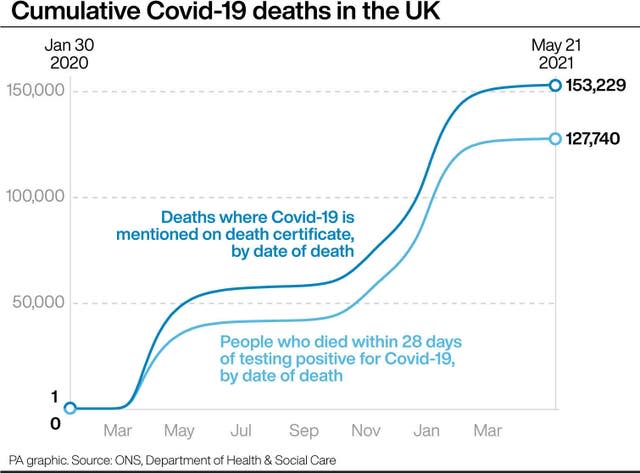June unlocking on track amid falling deaths and rising vaccination rates
Boris Johnson has insisted there is “nothing in the data at the moment” to prevent ending Covid-19 restrictions later this month, as the proportion of deaths involving the virus fell to the lowest level in eight months.
But the Prime Minister warned there is a need for caution, saying there is “no question” of an increase in infection rates.
Latest figures from the Office for National Statistics (ONS) show 9,860 deaths from all causes registered in the week ending May 21, and of these, 1.1% (107 deaths) had “novel coronavirus” mentioned on the death certificate.
The last time the proportion was so low was in the week ending September 11, when the virus accounted for 1.0% of deaths, according to PA news agency analysis.
At the peak of the second wave, in the week ending January 29, Covid-19 accounted for 45.7% of registered deaths.
The figures come on the same day it was confirmed 75% of UK adults across the UK had now had their first coronavirus jab, and 50% of adults in England had received both doses.
A total of 39,585,665 first doses have now been delivered since the vaccination rollout began almost six months ago.
This is the equivalent of 75.2% of all people aged 18 and over.
Debate is continuing over whether the final stages of unlocking restrictions in England can go ahead on June 21, due to concerns over the spread of the coronavirus variant first identified in India.

Mr Johnson said on Wednesday that there was “nothing in the data at the moment that means we can’t go ahead” with the next stage.
But he warned: “We’ve got to be so cautious because there’s no question, the ONS data of infection rates is showing an increase.
The Prime Minister said: “We always knew that was going to happen, don’t forget, we always said that the unlocking steps that we’ve taken would lead to increases in infection.
“What we need to work out is to what extent the vaccination programme has protected enough of us, particularly the elderly and vulnerable, against a new surge.
“And there, I’m afraid, the data is just still ambiguous.”
However a reduction in deaths reported, and vaccine success, may give ministers the confidence to go ahead with easing restrictions.

Government figures, based on people who died within 28 days of testing positive for Covid-19, show that zero Covid-19 deaths were reported in the UK on Tuesday.
Latest vaccine figures show that in Wales, 2,152,709 first doses have been given, the equivalent of 85.3% of the adult population.
This is well ahead of the other three nations of the UK, with England now on 74.7% (33,085,145 first doses), Scotland on 74.1% (3,286,261 first doses) and Northern Ireland on 73.1% (1,061,550 first doses).
These figures have been published by the UK’s four health agencies.
They also show that an estimated 49.5% of UK adults are now fully vaccinated against Covid-19, including half (50.0%) of adults in England.
In Scotland 47.5% of adults are estimated to have received both doses, along with 46.5% in Northern Ireland and 45.1% in Wales.

The vaccination programme in England will be extended to all adults within weeks, while all those aged 18 and over in Wales and Northern Ireland are able to book their jabs.
In Scotland, over-18s are being invited to pre-register for a jab with appointments starting in mid-June.
Health Secretary Matt Hancock told the Global Vaccine Confidence Summit in Oxford on Wednesday: “Across the UK confidence in the vaccine programme has been sky high.
“We continue to top the list of places where people are willing to take, or have taken, a Covid vaccine – around nine in 10 of us.”
NHS England’s lead for the NHS vaccination programme, Dr Emily Lawson, said: “Today marks another huge milestone in the NHS Covid-19 vaccination programme, as half of adults in England are now fully vaccinated, while three quarters have received a first dose.
“Thanks to NHS staff and volunteers who have worked tirelessly to get jabs in arms, more than 55 million doses have been delivered since the NHS jabbed the first person in the world outside of a clinical trial in December, saving thousands of lives.

“The Covid-19 vaccine is our most effective weapon against coronavirus and there has never been a more important time to get protected. So, when you’re contacted by the NHS, please book your lifesaving jab or bring forward your second dose of vital protection.”
Separate data from NHS England showed that the number of patients in hospital with Covid-19 in England has fallen 98% from the second wave peak.
In Scotland, First Minister Nicola Sturgeon has paused plans to ease restrictions in much of the country.
She announced on Tuesday that while parts of the country will move to Level 1 of the Scottish Government’s restrictions from Saturday, much of the central belt including Edinburgh, Dundee and Glasgow will be kept in Level 2.
Ms Sturgeon said the country was still at a “delicate and fragile point” in the battle with the virus, in an announcement on restrictions which she described as a “mixed bag”.
Scotland’s national clinical director, Jason Leitch, warned the Indian variant “is causing us some challenge and is spreading quicker than we hoped”.
Sir John Bell, regius professor of medicine at Oxford University, told BBC Radio 4’s Today programme that current figures “don’t look too intimidating” but they still need to “play out for a couple of weeks” before the Government makes its final decision on whether the June 21 reopening in England can go ahead.
He said: “I think the gain now is, can we get more people vaccinated down into younger, younger age groups to try and stop more transmission.”


